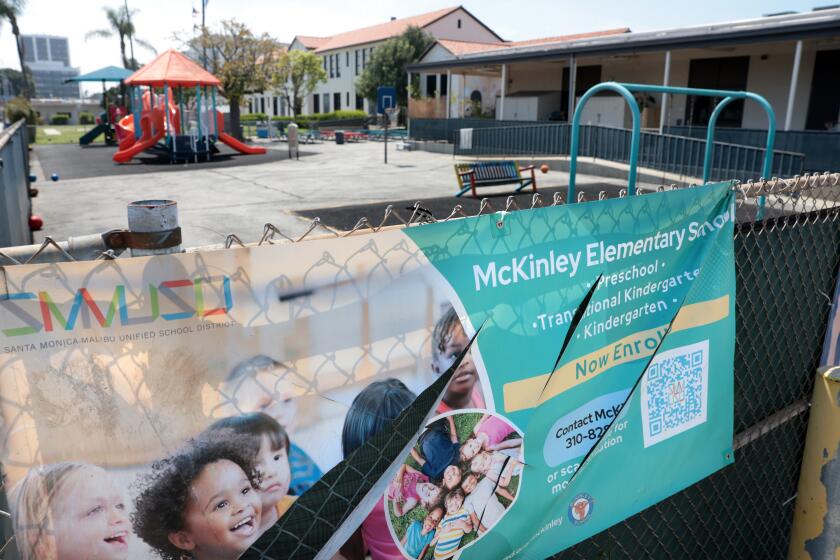Caltech Relaxes With Shakespeare’s Every Word
In a marathon convergence of arts and science that ended Saturday afternoon, a group of Caltech students figured out just what it would take to pull off a 24-hour Shakespeare Read-a-Thon, reciting all his comedies, histories, tragedies and sonnets in one bleary-eyed event.
They just can’t help themselves, these budding mathematicians, scientists and physicists.
Based on some estimates -- “Hamlet” is about 4,000 lines and takes about four hours to read -- it was reasonable to assume a 1,000-line-per-hour rate of recitation. The result was five reading rooms, four six-hour shifts and 80 readers. Reading began at 4 p.m. Friday.
“It’s just a fun, nice way to balance your life,” said Galen Loram, a junior economics major and the student body president, refreshed after a 2 1/2-hour reading of “The Tempest.”
With less than two weeks before finals and a long holiday weekend at hand, the students decided they needed to have some fun, pull their faces out from their quantum mechanics textbooks and kick back with “Macbeth.”
“It’s liberation!” said Maryam Ali, a junior chemical engineering major and part of “The Comedy of Errors” group. “I get to exercise the other side of my brain and relax.”
The challenge of Shakespeare, she explained, was “decoding the language.”
Oops. She just can’t help herself.
“As scientists, we call it decoding.... I think life is all about decoding things.”
Her friend Emily Russell, a freshman physics major, interrupts.
“OK, a lot of people call it interpretation,” when it comes to Shakespeare. “What’s important is that the artsy stuff is what keeps you sane and relieves stress.”
Yet the mind of a Caltech Shakespeare lover is different from, say, an English major. “Science is a fundamental part of our being,” Russell said. “We can’t escape it if we tried.”
The reason the Caltech students publicized their private reading is that they wanted the rest of us to know that even though they attend a small, elite science university, they can be balanced, holistic and cultured people too.
But with trademark Caltech intensity, the event was full-immersion Shakespeare, with only five- to 10-minute breaks between plays and after the third acts. Talking to outsiders during a reading drew disapproving frowns. In between readings of “As You Like It,” Ryan Witt, a sophomore computer science major, couldn’t part with his laptop. He designed a website for the event. He snapped digital photos and updated the site every two hours.
Reader John Sadowski, a freshman chemistry major, said Shakespeare’s clever way with words intrigued him and had a way of infiltrating his thoughts, even when he recently overslept before a math midterm.
“When I saw that test, all I could think of was this passage from ‘Macbeth,’ ” he said, reciting from Act 2 in a deep, theatrical voice:
“Shake off this downy sleep, death’s counterfeit,
And look in death itself!”
“It’s like Shakespeare gets into your head.”
They just can’t help themselves.
Mathematics major Nicholas Rupprecht and his fellow readers stopped cold during a passage from Act 3 of “Richard II.”
“Discomfortable cousin! know’st thou not
That when the searching eye of heaven is hid,
Behind the globe, that lights the lower world....”
“He seems to be saying the Earth is revolving around the sun; you think Shakespeare knew that?” asked one student.
“He definitely seems to be putting the sun in a positive place of power,” commented Rupprecht. “Let’s see, wasn’t this written in the late 1500s? Post-Copernicus, pre-Galileo.”
“There does seem to be a rotation in that passage,” said Caltech Shakespeare lecturer Shirley Marneus, who joined the students for a session before the group turned away from such digressions and focused back on the play.
Rupprecht, one of the lead organizers of the event, read through the night and by 10 a.m. was a bit jittery as he juggled several parts in “A Midsummer Night’s Dream.”
Only half-jokingly, he described organizing it as an “NP-complete,” which in complexity theory is a really hard problem. But his analysis of the time-reader ratio was almost perfect.
The marathon ended at 3:45 p.m., Saturday, 15 minutes short of 24 hours.
“In reality, I had a wide margin of error,” Rupprecht said.



